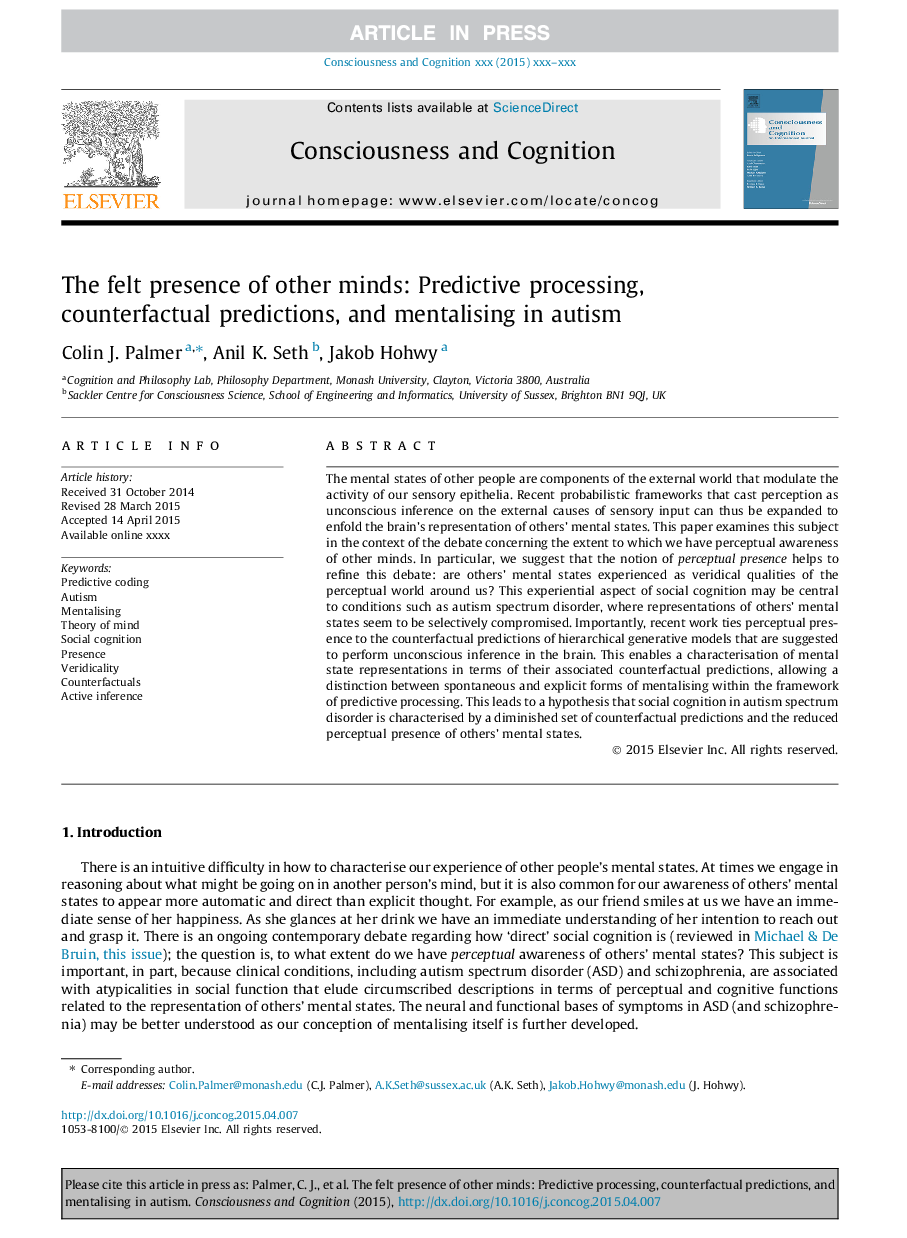| کد مقاله | کد نشریه | سال انتشار | مقاله انگلیسی | نسخه تمام متن |
|---|---|---|---|---|
| 7288910 | 1474175 | 2015 | 14 صفحه PDF | دانلود رایگان |
عنوان انگلیسی مقاله ISI
The felt presence of other minds: Predictive processing, counterfactual predictions, and mentalising in autism
ترجمه فارسی عنوان
احساس حضور دیگر ذهن ها: پردازش پیش بینی شده، پیش بینی های متقابل و ذهنیت در اوتیسم
دانلود مقاله + سفارش ترجمه
دانلود مقاله ISI انگلیسی
رایگان برای ایرانیان
کلمات کلیدی
ترجمه چکیده
وضعیت ذهنی افراد دیگر جزء دنیای بیرونی است که فعالیت اپیتلیال حسی ما را مدون می کند. چارچوب احتمالی اخیر که ادعای ناخودآگاه را در مورد علل خارجی ورودی های حسی به عنوان ناخودآگاه یاد می گیرد، می تواند گسترش یابد تا نمایانگر مغز از وضعیت ذهنی دیگران را تقویت کند. این مقاله این موضوع را در زمینه بحث و بررسی درباره میزان شناخت ادراکی ذهن های دیگر بررسی می کند. به طور خاص، ما پیشنهاد می کنیم که مفهوم حضور ادراکی به اصلاح این بحث کمک می کند: آیا حالت ذهنی دیگران به عنوان ویژگی های اعتقادی از جهان ادراکی در اطراف ما تجربه می شود؟ این جنبه تجربی شناخت اجتماعی ممکن است در شرایطی نظیر اختلال طیف اوتیسم باشد که در آن بازنمایی های وضعیت ذهنی دیگران به طور انتخابی به خطر می افتد. مهمتر از همه، روابط کاری اخیر ارتباط ادراکی با پیش بینی های پیش فرض مدل های سلسله مراتبی نسبی است که پیشنهاد می شود نتیجه گیری ناخودآگاه در مغز انجام شود. این ویژگی توصیفات حالت های ذهنی را از لحاظ پیش بینی های مربوط به پیشآمدی آن را امکان پذیر می سازد و اجازه می دهد تمایز بین اشکال خودجوش و صریح ذهنی در چارچوب پردازش پیش بینی شود. این منجر به یک فرضیه می شود که شناخت اجتماعی در اختلال طیف اوتیسم با مجموعه ای از پیش بینی های ضد حقیقی و کمترین ادراک حضور در شرایط ذهنی دیگر مشخص شده است.
موضوعات مرتبط
علوم زیستی و بیوفناوری
علم عصب شناسی
علوم اعصاب شناختی
چکیده انگلیسی
The mental states of other people are components of the external world that modulate the activity of our sensory epithelia. Recent probabilistic frameworks that cast perception as unconscious inference on the external causes of sensory input can thus be expanded to enfold the brain's representation of others' mental states. This paper examines this subject in the context of the debate concerning the extent to which we have perceptual awareness of other minds. In particular, we suggest that the notion of perceptual presence helps to refine this debate: are others' mental states experienced as veridical qualities of the perceptual world around us? This experiential aspect of social cognition may be central to conditions such as autism spectrum disorder, where representations of others' mental states seem to be selectively compromised. Importantly, recent work ties perceptual presence to the counterfactual predictions of hierarchical generative models that are suggested to perform unconscious inference in the brain. This enables a characterisation of mental state representations in terms of their associated counterfactual predictions, allowing a distinction between spontaneous and explicit forms of mentalising within the framework of predictive processing. This leads to a hypothesis that social cognition in autism spectrum disorder is characterised by a diminished set of counterfactual predictions and the reduced perceptual presence of others' mental states.
ناشر
Database: Elsevier - ScienceDirect (ساینس دایرکت)
Journal: Consciousness and Cognition - Volume 36, November 2015, Pages 376-389
Journal: Consciousness and Cognition - Volume 36, November 2015, Pages 376-389
نویسندگان
Colin J. Palmer, Anil K. Seth, Jakob Hohwy,
